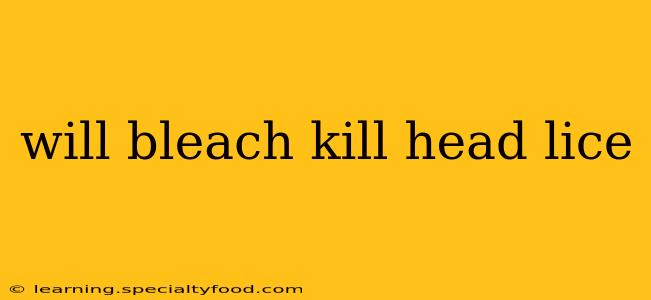Will Bleach Kill Head Lice? A Comprehensive Guide to Head Lice Treatment
Head lice are a common nuisance, particularly among school-aged children. While many home remedies are suggested, the question of whether bleach can kill head lice is a crucial one – and the answer is a resounding no. Using bleach to treat head lice is extremely dangerous and should never be attempted.
Why Bleach is NOT a Solution for Head Lice:
Bleach is a harsh chemical, designed for disinfecting surfaces, not for treating human hair and scalp. Applying bleach to your scalp can lead to severe consequences, including:
- Chemical burns: Bleach can cause significant burns to the scalp, leading to pain, scarring, and potential infections.
- Hair damage: The harsh chemicals in bleach can severely damage your hair, leading to breakage, dryness, and even hair loss.
- Respiratory problems: Inhaling bleach fumes can irritate the lungs and cause respiratory issues.
- Eye damage: Bleach getting into your eyes can cause serious damage, potentially leading to blindness.
The risks far outweigh any perceived benefits. While bleach might kill some lice on contact, it won't effectively penetrate the nits (lice eggs) attached to the hair shaft. Furthermore, the application process is risky and difficult to control, increasing the chances of accidental exposure to sensitive areas like eyes and nose.
What are the Effective Treatments for Head Lice?
Several safe and effective treatments are available for head lice infestations. These include:
- Over-the-counter (OTC) medications: Many pharmacies sell lice-killing shampoos and lotions containing permethrin or pyrethrin. Always follow the instructions carefully. Multiple treatments might be necessary.
- Prescription medications: In cases where OTC treatments fail, your doctor can prescribe stronger medications.
- Wet combing: This method involves using a fine-toothed comb to physically remove lice and nits from the hair after it's been wetted with conditioner. It's a time-consuming process but a safe and effective way to remove lice, especially when used in conjunction with other treatments.
How to Prevent Head Lice Infestations
Prevention is key! Here are some helpful tips:
- Regular checks: Regularly inspect your hair and your children's hair for lice and nits.
- Avoid head-to-head contact: Discourage close contact between heads, particularly in crowded settings like schools and daycare.
- Don't share personal items: This includes hats, scarves, hairbrushes, combs, and headphones.
- Wash bedding and clothing: Wash all bedding, clothing, and towels in hot water (at least 130°F) and dry them on high heat for at least 20 minutes.
Are there any natural remedies for head lice?
While some people suggest natural remedies like tea tree oil or vinegar, scientific evidence supporting their effectiveness against head lice is limited. It's crucial to consult with a doctor or healthcare professional before trying any alternative treatments. These remedies may not be as effective as pharmaceutical options and could delay proper treatment, leading to a more prolonged infestation.
What should I do if I find head lice?
If you suspect a head lice infestation, immediately consult your doctor or pharmacist. They can provide accurate diagnosis and recommend appropriate treatment options. Early intervention is key to preventing the spread of lice and ensuring effective treatment.
In conclusion: While the temptation to use readily available household products like bleach might seem appealing, it is crucial to prioritize safety and effectiveness. Bleach is not an appropriate treatment for head lice and can cause serious harm. Always opt for safe and proven methods, and consult a healthcare professional for guidance. Remember to focus on prevention strategies to minimize the risk of head lice infestations in the first place.
